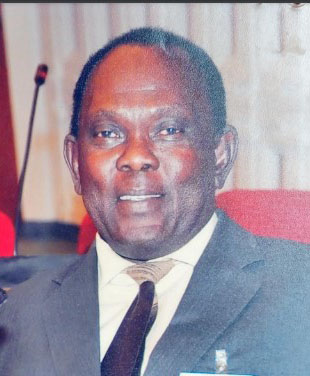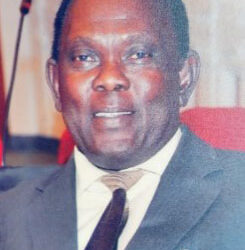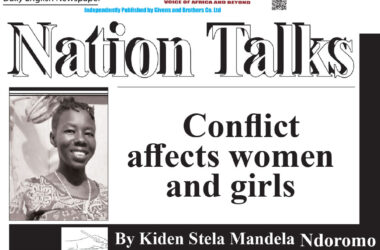By James Aniceto Batikayo
As we commemorate the Comprehensive Peace Agreement 2005, looking into the future for 2026 General Elections, which is a short while from now, there are important tiny issues that we, people of South Sudan, should pay close and strict attention to and see how their nitty gritty impact on us.
By-and-large, we must not allow people to ridicule us calling us a fail state, right from the word go, in our independence and in our preparation for the first general elections. There are questions which seek convincing answers that we must provide to face the challenges before us. These questions are connected with the political parties which are now in disarray as we move towards the elections and they are indeed the principle contenders in those elections.
First, what does it mean to have a name of a political party such as that which calls for the Liberation of a neighboring and friendly country to us in South Sudan? Yes, there is a civil war raging now in our country’s neighborhood between a government and a militia, but do we want to jump into that war by using the term “liberation of that country” as our parties’ names? If we do, who are we fighting against, the government or the militia? Are we not thus tempering with the International Law?
Second, Will voters in the forthcoming elections not get confused to find political parties having same or similar names on the ballot boxes, e.g. “XY Liberation Party (A), … XY Liberation Party (B) ……or …… ZY (Main stream) and ….ZY (Big stream) … and so forth”, causing any of these voters to vote wrongly for a party when he or she wanted actually to vote for the other party? Will that be really “free, transparent and credible election” that we want to have in South Sudan?
Third, is it wise to follow a party that calls itself “Party X in Opposition” but on the contrary it is in fact on the top of the government hierarchy? Will a voter, in such a situation, not get confused about who constitute the government and who form the opposition to that government if we are a democracy, so that he or she could avoid voting mistakenly or otherwise, abstain from voting altogether because of the confusion? Is it absolutely necessary for a political party to call itself a name which is one of the historic names such as, “the Anyanya Movement” that brought us the Addis Ababa Peace Agreement in 1972, so that this party becomes known as “the Anyanya Liberation Party” and as such guarantees always landslide victory in the elections all over South Sudan? Are such political parties or movements looking to be paid and given fortunes for their fight in the bush for the independence of South Sudan? Is that the reason which makes them to stick tightly on the names of our country’s freedom fighting movements and to have the law downtrodden? Fourth, in most countries of the world today, political parties register in accordance with the law under the watch of the Ministry of Justice, but not according to a peace agreement as is claimed in Juba at present under the supervision of a layman commission.
Is it difficult for any of the political parties that are signatories to the Revitalized Agreement on Resolution of Conflict in South Sudan (R-ARCSS) to organize their Founding Conferences this year prior to the elections in the year 2026? Why do political parties that are not signatories to the peace agreement or are indeed signatories to it, refuse to respect the law claiming that the peace agreement, i.e. the R-ARCSS automatically exempts them from holding their Founding Conferences according to the Political Parties Act 2012, although such exemption is not written in the R-ARCSS itself? As citizens, we need to see those political parties coming to us in the elections, legally recognized carrying their manifestos and banners but not their guns and rockets. How can elections be free, fair and credible when competing parties are gunmen and gangs? People are happy with President Salva Kiir’s decision to unite, from February this year 2025, the forces that fought for the independence of the country into one national army.
Could all holdout forces positively cooperate on that? Fifth: Can a law not be made by parliament to enable the political parties that are signatories to the peace agreement i.e. the R-ARCSS or probably the Ptomaine Consensus as well, to use both their present worriers’ names and the new civil identification names which will be permanent and the present names will have to end with the R-ARCSS in 2026, so that our elections are conducted without confusions or confrontations? Why not simply use instead names for political parties or alliances such as the Independence Party or Alliance, the Democratic Party or Alliance, the Freedom Party or Alliance, and so forth?
Good answers to the above-mentioned questions will make us in South Sudan see many of the political parties operating really revivified and standing tall in the political arena, particularly if they have their individual Political Charters and other basic documents. A political party or a group of political parties in an alliance must have the Party or the Alliance Vision, Mission and Persuasion clearly spelt out in their charters that should be rolled out to the public to help citizens identify which party or party alliance must one of them join as a member or vote for during elections? Where there are more than 60 Political Parties as claimed in South Sudan at present, the parties should group up mainly into 3 different categories as in France, Germany, South Africa and other countries. These three can respectively be called: The Rightists, the Leftists and the Centralists. For example, the Persuasion of the Rightists may depend on mining gold and other minerals, production of Petroleum and gas, set up of heavy industries such as cement factory, textile, etc., as their priority.
The Leftists may prefer in their persuasion as priority, agriculture and agro-industry, export of cash crops such as coffee, tea, sugar, fruits, American cotton, tobacco, timber, ground-nuts oil, gum-Arabic, rubber, etc. The Centralists in their persuasion may advocate for Basic Infrastructure first as priority.
These are Roads, Bridges, Air-ports, Railways, Telecommunication, Railways, modern cities and towns’ constructions, air and river-transport, etc. All of the party categories will definitely engage in rendering basic services to the citizens. Services such as: Education, Health, Water, Electricity, Gas, and others. The choice is thus made very simple for every citizen to take. His or her take lies on what is best for one’s constituency or even for oneself but does not depend on nepotism, tribalism, racialism, sectarianism and any divisive tendencies. Already, in South Sudan, we have had the experience of categorizing political parties and we have formed alliances and coalitions.
One of the major stumbling blocks in front of political parties in South Sudan is the funding of their activities, settlement of their office rents or office construction costs, and the payment of cadre allowances and motivations.
The party members do not regularly pay their membership fees as expected. In Old Sudan the Colonial Condominium lent, the Umma Party and the National Union Party (NUP) which later became the Democratic Union Party (DUP), Bank Loans and agricultural lands, to work and fund themselves. This enabled them to be the biggest two parties in the country and to keep their party cadres and followers tied and unwavering since establishment and for more than 60 years to date.
The government in South Sudan today can do to political parties what the Condominium did to those parties in previous Sudan and open also large gateways for business opportunities to them so that they can adequately fund themselves, train and maintain their cadres as well. Now is the momentum that the country must seize and not miss, to have our political parties revivified.
God Bless.




